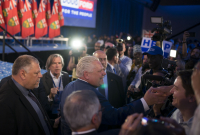Support strong Canadian climate journalism for 2025
Since he was elected in 2014, Mayor John Tory has had it easy. With Doug Ford now the premier-designate of Ontario, things are about to get hard.
And Tory needs to show Toronto he’s up for the fight.
I’m not saying Tory’s job presiding over Canada’s largest city for the last four years has been a walk in the park. Toronto City Hall isn’t the Canadian Senate. There are responsibilities. There’s work. There have been challenges.
But he’s also had it about as good as any mayor of Toronto can possibly get it.
Toronto’s economy has been steady, spared from major shocks. Condo cranes continue to dominate the skyline. And thanks to the heavy lifting of former mayor David Miller, who introduced a municipal land transfer tax, those cranes equal cash for city hall — land transfer tax revenue has increased by more than fivefold since it was first implemented ten years ago.
Tory has also been lucky, since 2015, to work with a federal government ready to spend on things like transit and housing.
The biggest asset for Tory, however, has been the friends he’s had at Queen’s Park. The departing Liberal government steadily – if slowly – uploaded costs from the city. A report on Toronto’s long-term fiscal plan, published this March, gave the provincial government credit for providing the city about $40 million in budget relief annually over the last decade.
And while the prolonged and topsy-turvy transit debates were frustrating, the balance sheet does not lie. The Ontario Liberal government – led first by Dalton McGuinty and later by Kathleen Wynne – kicked in $6.6 billion for the Eglinton LRT, $1.4 billion for the Scarborough Subway, $1.2 billion for the Finch LRT, as well as funding for parts of Tory’s signature SmartTrack plan, the TTC’s new streetcars and subway trains, and a bunch of other projects.
Billions upon billions upon billions.
I don’t want this to read like I’m proposing a love-in for the departing provincial government. There were many missteps along the way. But I do think it’s entirely fair to point out that things could have been a whole lot worse.
And now, in these Fordian times, things almost certainly will be.
It’s hard to predict exactly what Ford will do with his new job, but it’s a safe bet that provincial money won’t flow as freely. I know Ford has promised he can achieve his many billions in promised savings without cutting services, but math is math and stones don’t bleed. Most likely, Ford’s cuts won’t come in the form of specific and requested cuts to programs but rather orders to various ministries to freeze or reduce their budgets.
That will, if the past is any guide, lead to a chain of events in which the budget pressure is passed down the line, until it ends up at the municipal level, where there’s no one left to pass the buck to.
Tory needs to be ready for this. The city has options. If Ford’s fiscal belt-tightening threatens things like Toronto’s already-overburdened shelter system, Tory will need to make a clear choice: either raise city property taxes to fill the gap or risk more people freezing on city streets.
That’s not going to be easy. Keeping property tax increases below the rate of inflation has been a pledge Tory has not been very willing to break, even in situations where city service levels are threatened. He needs to think seriously about whether that pledge is realistic in the age of Ford.
Ford is also likely to bring a whole new level of chaos to intergovernmental affairs. Hungry for any move he can spin as a victory, I’d bet Ford will be big on announcing decisions and then figuring out the details later. That could take the form of randomly adding a couple of stops to the Scarborough subway, or seizing ownership of the TTC’s subway system, or announcing a change to the policies governing overdose prevention sites that offer supervised injection.
In cases like these, I’d like a mayor that’s willing to stand up and respond with a firm 'no.' No offers to compromise, and no pledges to study whatever it is Ford wants to do. Yes, ultimately Ford, with a majority government, has the power to overrule the mayor, but that doesn’t mean the mayor should ever make life easy for him.
Can Tory, who built his political reputation as a conciliator, consistently show that kind of backbone? With Toronto’s mayoral election set for October 22, he’s got a little over four months to show residents he can. I won’t predict the results of that election, but I will predict this: after seeing what Ford’s cuts and chaos could mean for their city, Toronto voters are going to be looking for a leader who is spoiling for a fight.






Comments